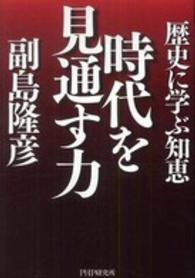- ホーム
- > 洋書
- > 英文書
- > Psychology
Full Description
Cognition is usually associated with brain activity. Undoubtedly, some brain activity is necessary for it to function. However, the last thirty years have revolutionized the way we intend and think about cognition. These developments allow us to think of cognition as distributed in the sense that it needs tools, artifacts, objects, and other external entities to allow the brain to operate properly. Organizational Cognition: The Theory of Social Organizing takes this perspective and applies it to the organization by introducing a model that defines the elements that allow cognition to work. This model shows that cognition needs the combined and simultaneous presence of micro aspects—i.e. the biological individual—and macro super-structural elements—e.g. organizational climate, culture, norms, values, rules. These two become practice of cognition as they materialize in a meso domain—this is any action that allows individuals to perform their daily duties. Due to the micro-meso-macro interactions, this has been called the 3M Model. Most of what happens in the meso domain relates to exchanges between two or more people, i.e. it is a social activity. This is usually mentioned in the perspectives above, but it is rarely explored.
By bringing meso activities to the center of cognition, the book develops and presents the Theory of Social Organizing. Not only this is useful to organizational scholars, but it also opens a new path for cognition research.
Contents
1. Setting the scene Part 1: Theoretical framework 2. Changing practices: Using the 3M model to engineer change 3. Perception as conceptual orderliness in enlanguaged practices 4. Computational revival: Why and how computation is still relevant to the study of recognition Part 2: Practice and applications 5. Reflections on social organizing 6. Theorizing transformative educational technology as a meso-related venture 7. Organization-cognition fit: Supplementing or complementing team's capabilities? 8. Thinking, faster and slower: Towards a dynamic view of organizational cognition 9. A dynamic view of organizing: An integrative approach 10. The primacy of "Disorganization" in social organizing 11. Sociotechnical dilemmas in healthcare: A cognitive ethnography 12. Cognitive cross-over: Implications for a Theory of Social Organizing 13. Enacting Ontological Design: a Vocabulary of Change from Organisms to organizations Part 3: Reflections and perspectives 14. Towards a science of the artificially organized








